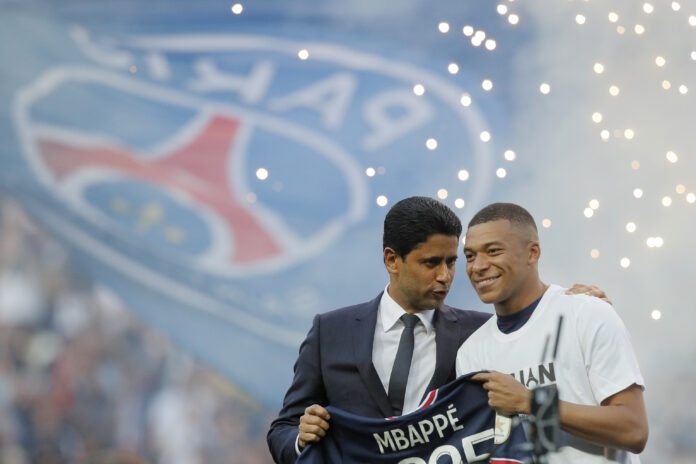Between the coasts of Jeddah and Dubai, the western and eastern ends of the Arabian Peninsula, there are almost 2,000 kilometers of desert, oil fields, gas reserves, almost dictatorial monarchical regimes and luxury, especially luxury. An artificial luxury built on the dust and sand of Saudi Arabia, Qatar and the United Arab Emirates, three of the countries that accumulate the most power and money in the Middle East and on the entire planet. The trio of nations and their big cities, from Jeddah to Dubai, from the Red Sea to the Persian Gulf passing through Riyadh, Doha or Abu Dhabi, have formed for a few months the new and controversial cradle of world sport.
The World Cup in Qatar and the Spanish Super Cup in Riyadh and Jeddah (Saudi Arabia); Formula 1 in Jeddah, Losail (Qatar) and Abu Dhabi (Emirates); MotoGP at Losail; the origin of the new Saudi-funded golf tournament, LIV Golf; the new padel circuit promoted by QSI, the fund chaired by Nasser Al-Khelaifi; the team from Pogacar, UAE (Emirates), which dominates current cycling; the Dakar Rally in Saudi Arabia; the 2019 World Championships in Athletics and 2024 Swimming in Doha; the tennis tournaments in Doha, Dubai and Abu Dhabi, the first NBA preseason game to be played in October in Abu Dhabi…
And it’s not just about the events that take place, but what is coordinated and generated from there and has a massive influence on the rest of the planet. Funds from Saudi Arabia, Qatar and the Emirates benefit some of the largest sports organizations in the world. The City Football Group is the tenth largest sports empire in the world, according to Forbes, with a value of 5,000 million dollars, the first after the great properties of the United States. The group led by the Sheikh of Abu Dhabi Mansour bin Zayed Al Nahayan, a member of the family that governs Abu Dhabi, controls Manchester City, New York City in MLS, Girona in the Spanish Second Division and Troyes in Ligue 2 French, among others. And through its two airlines, the UAE brings its image to the center of world sport.
Etihad, based in Abu Dhabi, names the stadium and the City shirt in exchange for 67 million a year, according to reports in the British press, and the F1 GP of its city. Emirates, from Dubai, owns the façade of another large field in England, that of Arsenal, and bears his name to the center of the gunner shirt, the latter paying about 60 million annually, 10 less than what Madrid bills him for appearing on the white of his kit. In addition, it appears in the elastic of Milan, Lyon or Benfica, in the nets of the US Open, in most F1 circuits as the main commercial partner, in cycling, golf, horse riding, rugby, sailing or cricket events… And It even names the FA Cup, the great cup of English football.
The first NBA game in the Middle East will arrive in Abu Dhabi in October. It will be preseason, but it will be: “It is an important milestone for the global growth of basketball. Abu Dhabi is a vibrant multicultural center with a proven track record for hosting world-class events,” Ralph Rivera, head of the NBA in Middle East. “Among other things, sports will be used to foster values such as camaraderie, respect and inclusion,” he adds, concluding by admitting that “the goal of the NBA is to inspire and connect people.”
Writing the exact figure of all the money spent by the UAE is an impossible exercise, almost as much as doing it with Qatar, which has hosted more than 500 sporting events in the last 15 years and which this year is the great protagonist of world sport for two reasons : the World Cup and the ownership of PSG, the club that Al-Khelaifi governs from Doha and that will keep Messi, Neymar and Mbappé together during the World Cup. The most expensive World Cup in history could reach 200,000 million in total spending, the country is leaving “500 million a week”, according to its finance minister, and more than 6,500 workers have already died, according to The Guardian.
Qatar follows the same formula as the Emirates for its sponsorships. Qatar Airways, its main airline, has appeared on the shirts of Barcelona, Bayern or Rome and now it seems that it will also do so on that of PSG, the team owned by the Arab country, which has terminated the 50 million annual contract with the French hotel company accor. This company is, coincidentally, in charge of the hotels for the next World Cup. A tournament marked in red in the Qatari line of operations, which will not stop here and whose great aspiration is to organize the Olympic Games. Doha has already tried it in 2016, 2020, 2024 and 2032, while Dubai did it in 2028. They have not won any, but they will return to the fray for 2036. Before, in 2030, they will host the Asian Games. “They are a national priority”, they have defined it from Doha. “The World Cup will serve as a vehicle for the nation to achieve the goals set out in the Qatar National Vision 2030,” they promote in their official statements. A World Cup with eight stadiums separated by just an hour’s drive and promoted by almost all the stars of the world of football. David Beckham, for example, has signed a 277 million contract to be an ambassador for the tournament and the country for the next few years.
They have a much more forward-looking vision when they invest in sports. They are forming a lot.
The Aspire Academy is, together with QSI, the sports arm of the Qatari state. Created in 2004, it prepares thousands of children and adolescents from all over the world with coaches brought from the best quarries in Europe. Through Aspire, Qatar began buying some modest European football clubs years ago, such as Cultural Leonesa from Spain or KAS Eupen from Belgium. Gone are the signings of veteran footballers from other leagues, such as Raúl González or Xavi Hernández. The model has changed and has its audiovisual arm in BeIN Sports, with the agreement of 300 million in three years with UEFA to broadcast the Champions League in the 22 countries in which the channel has rights, the vast majority in the East and part of Africa.
Maite Ventura, head of LaLiga in the Middle East, analyzes in this newspaper the increase in the number of sporting events in the area: “It is undeniable that not all countries have the economic capacity. But in recent years that investment has been professionalized Now they have a much more forward-looking vision when they invest in sport. They are training a lot,” he summarizes, and admits that “it is true that what you hear is what Qatar has spent on the World Cup, but they invest with a lot of vision and strategy. in transforming their leagues and federations”.
From Qatar, and through QSI, Premier Padel has also arrived, the circuit that has broken the normality of the World Padel Tour. “This area is the new cradle of world sport,” says Pablo Gómez, head of business development at Padel In, the largest club franchise in the Middle East. “They are creating all the best in the world and when you have a monopoly you can do whatever you want. No matter the amount, they are going to do what they want. And that goes for paddle tennis and for all sports. The final of the Champions will end up playing here. There is a lot of money, but they don’t throw it away. They are well advised.”
In Saudi Arabia the situation is not very different. The country, through its Ministry of Sports, works according to the ‘Vision 2030’ plan, by which it intends to organize 45 sporting events during this decade. Among them, a golf tournament that has gone around the world circuit, causing the abandonment of some PGA Tour stars and multiplying the prizes for the winners, and the famous Spanish Super Cup, which will be played on Saudi soil until 2029 in exchange for of 40 million annually.
The ‘sportwashing’ is to clean the reputation of those countries, which have dubious human rights issues, through sport.
Along with the World Cup, the Super Cup has been the tournament that has raised the most controversy in our country and whose officials have tried to defend the most, arguing the improvement in social freedoms in Arabia, something that the most critical voices warn of as the so-called sportwashing , in which according to The Guardian Saudi Arabia has invested more than a billion dollars in recent years. “Sportwashing is to clean the reputation of those countries, which have dubious human rights issues, through sport. Whiten them,” Toni Roca, CEO of the Sports Law Institute and director of Himnus, a specialized soccer office, explains to EL MUNDO. “From the legal point of view there is little to say, but there is from the moral and ethical point of view,” he adds.
That legal point of view is what critics of the practices of these countries have long sought. “They are killing the market. Sports, obviously, say ‘I’m not going to see so much dough in my life’. If a federation asks for five million to organize a World Cup and they offer 20… It’s brutal inflation and unfair competition “, explains Roca, now focusing on PSG and the UEFA Financial Fair Play controversy: “The television rights and ticket prices are what they are, you can’t change them much, so you only have the income from sponsorship. They camouflage the contributions of the State through sponsorships of state companies and they are not sponsorships at the market level. That is the trap,” Roca denounces. And meanwhile, the sport is played in the desert of the Middle East.
Conforms to The Trust Project criteria








